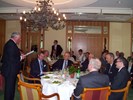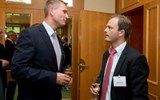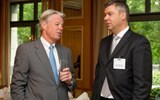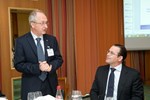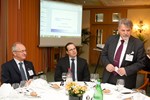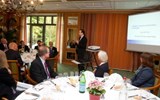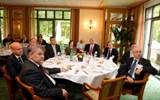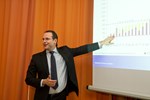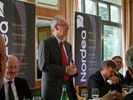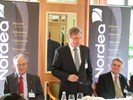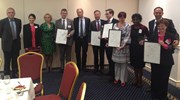Belgium
2.1 General
Belgium, officially the Kingdom of Belgium (French: Belgique, Dutch: België, German and Swedish: Belgien), is a state in Western Europe. It is a founding member of the European Union and hosts the EU's headquarters, as well as those of several other major international organisations such as NATO. Belgium covers an area of 30,528 square kilometres (11,787 sq mi), and has a population of about 10.8 million people. Straddling the cultural boundary between Germanic and Latin Europe, Belgium is home to two main linguistic groups, the Dutch-speakers, mostly Flemish, and the French-speakers, mostly Walloons, plus a small group of German-speakers. Belgium's two largest regions are the Dutch-speaking region of Flanders in the north and the French-speaking southern region of Wallonia. The Brussels-Capital Region, officially bilingual, is a mostly French-speaking enclave within the Flemish Region. A small German-speaking community exists in eastern Wallonia. Belgium's linguistic diversity and related political and cultural conflicts are reflected in the political history and a complex system of government. Belgium comprises two regions, three communities and six different governments.
Further information on http://www.belgium.be
2.2. Economy in Belgium
The modern, private enterprise economy ofBelgium has capitalised on its central geographic location, highly developed transport network, and diversified industrial and commercial base. The first country to undergo an industrial revolution on the continent of Europe in the early 19th century, Belgium developed an excellent transportation infrastructure of ports, canals, railways, and highways to integrate its industry with that of its neighbours. Industry is concentrated mainly in the populous Flanders in the north, around Brussels and in the two biggest Walloon cities, Liège and Charleroi, along the sillon industriel (in French). Belgium imports raw materials and semi-finished goods that are further processed and re-exported. Except for its coal, which is no longer economical to exploit, Belgium has virtually no natural resources. Nonetheless, most traditional industrial sectors are represented in the economy, including steel, textiles, refining, chemicals, food processing, pharmaceuticals, automobiles, electronics, and machinery fabrication. Despite the heavy industrial component, services account for 74.9% of GDP, while agriculture accounts for only 1% of GDP.
With exports equivalent to over two-thirds of GNP, Belgium depends heavily on world trade. Belgium's trade advantages are derived from its central geographic location and a highly skilled, multilingual, and productive work force. One of the founding members of the European Community, Belgium strongly supports deepening the powers of the present-day European Union to integrate European economies further. About three-quarters of its trade is realised with other EU countries.
Belgium's public debt is about 99% of GDP. The government succeeded in balancing its budget during the period 2000-2008, and income distribution is relatively equal. Belgium began circulating the euro currency in January 2002. Economic growth and foreign direct investment dropped in 2008. In 2009 Belgium is likely to have negative growth, growing unemployment, and a 3% budget deficit, stemming from the worldwide banking crisis.

Read more on:
- The world Factbook features a map and brief descriptions of geography, economy, government and politics. Belgium is a founding member of the European Union and hosts its headquarters, as well as those of the major international organizations, including NATO. https://www.cia.gov/library/publications/the-world-factbook/geos/be.html
- Belgium takes on the six-month rotating presidency of the European Union on 1 July with a caretaker government in charge, following national elections which saw Flemish separatist leader Bart De Wever top the polls. See Euractiv, the voice of Europe: http://www.euractiv.com/en/priorities/the-belgian-eu-presidency-linksdossier-495582
- Belgian Presidency of the Council of the European Union: http://www.eutrio.be




